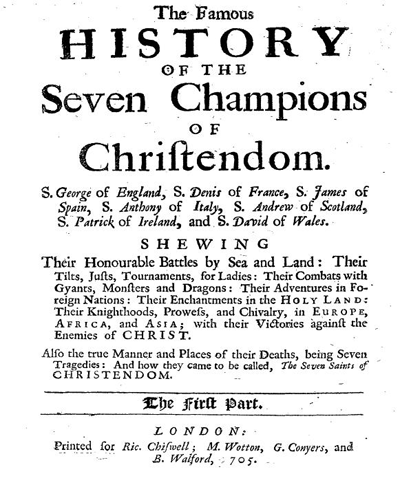Particular Episodes for analysis in class
Palace Beautiful (45-55) (See note on p. 297)
The pilgrim’s responses to Prudence, Piety, and Charity (pp. 87 ff)
•This inward scrutiny has a secular parallel in the philosophical methods of Descartes and Locke.
2. APOLLYON: a combat for half a day(55-61)
Biblical material becomes context for romance.
Romance is then used or subordinated to spiritual aims.
---See notes on p. 298.
Revelation 9:11"'the angel of the bottomless pit"; "'the destroyer'"
Apollyon "symboliz[es] the power of the devil" and "represents the oppressive power of the state.'" Bunyan says Apollyon is one of the "'brood of Cain.'"
For description, Bunyan uses details from Job 41 and Revelation 13:2. He also uses "descriptions of combats between knights and dragons or giants in popular romances." For the battle, see also the war in Heaven in Rev. 12:7.
Pay special attention to the dialogue: "you are one of my Subjects"; "I have let myself to another"; "it is ordinary for those that have professed themselves his Servants . . . to give him the slip; and return again to me" (57).
This episode combines the 17th. c. language of political allegiance with an apocalyptic understanding of a battle between God’s forces and the Devil’s.
What is the Tree of Life doing here?
It STILL EXISTS! It has not receded into the distant past.
----------------
3. The Valley of the Shadow of Death (61 ff.) See notes (299).Psalm 23 “Yea though I walk through the valley of the Shadow of Death I will fear no evil. . . .”
“A wilderness, a land of deserts, and of pits, a land of drought, and of the shadow of death, a land that no man (but a Christian) passeth through, and where no man dwelt” (61-2).
Notice how Bunyan describes the geography of the Valley.
The physical and psychological experience of the Valley: “dark as pitch”; “continual howling and yelling”; “a very deep ditch”; “a very dangerous quag”; an “exceeding narrow” pathway; flames, smoke; “doleful voices”;
King David was here: the "place" still exists:
"Into that Quagg King David once did fall": Psalm 51
Spiritual extremity: "The pathway was here also exceeding narrow . . . " (63 ff).
Estrangement from the self: (65)
The Valley in after view: (65-66)
-------------------------
4. Faithful and Christian (67ff)
•Narrative framework recalled by Faithful’s report on what people back home were saying about Christian.
"The Dog is turned to its vomit again" (68).
"The soul of religion is the practick part" (78)."What shall we do to be rid of him?" (79)
5. Vanity Fair (85, ff.)
This episode recapitulates the stories of all Christian martyrs.
Details of interest:
1. Beelzebub - in charge of the fair;
2. Presence of the Blessed One/the Prince of Princes at this fair
3. Names of the streets: Britain Row, French Row, Italian Row (wares of Rome and her merchandise are promoted in this fair)
4. Names of Jury: Mr. Love-lust, Mr. High-minded, et al.
5. 5000 years ago (3322 BC)
6. thefts, murders, adulteries, false-swearers, and that of a blood-red colour
7. Strangers in the world -" Outlandish-men"
8. "That Christianity, and, the Custom of our Town of Vanity, were Diametically opposite, and could not be reconciled."
9. The death of Faithful
